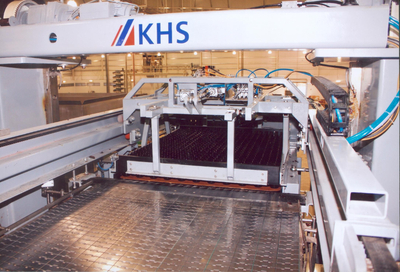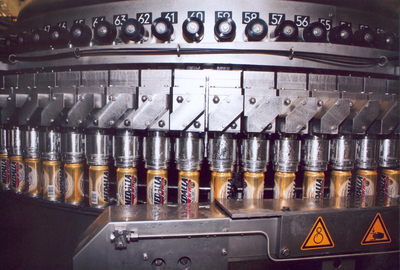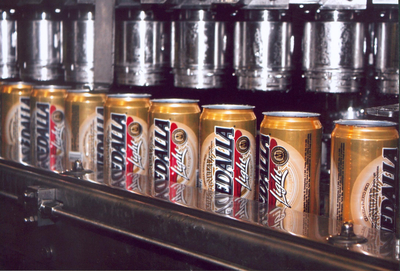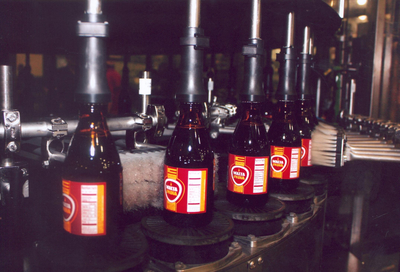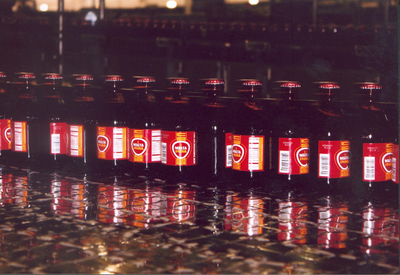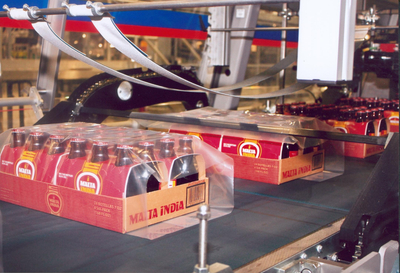
At World Class Level
Cervecería India, Puerto Rico, ready for the future with KHS technology
Ulrich Fischer*
Puerto Rico is the easternmost island in the Greater Antilles. Like its smaller neighboring islands, it is part of the free state of Puerto Rico, which is sovereign territory of the United States. The name of the island is no coincidence: translated into English, Puerto Rico means "rich port". To this very day, the name has held true. Puerto Rico, whose gross domestic product presently totals around $20,000 per person, is the strongest economic country in Latin America. This is surely one of the reasons for the island's high beer consumption, which currently amounts to a yearly 77 liters per capita. Throughout Latin America this is only topped by Venezuela, which boasts a pro capita consumption of 90 liters a year. Below these two in the rankings are Mexico (59 liters a year) and Brazil (50 liters a year). The people of Puerto Rico are particularly fond of light lagers, which in the local tropical climate and at temperatures of about 27°C the whole year round prove to be good thirst-quenchers. There is one beer in particular which is definitely in with the Puerto Ricans: Medalla Light. This is a light, high-quality, expressive lager that has plenty of taste as it contains more bitter substances than many other light beers. In addition, Medalla Light is the main brand produced by the only brewery in Puerto Rico: Cervecería India. Cervecería brews in Puerto Rico for Puerto Rico. It has an impressive history and today is considered one of the most up-to-the-minute breweries in Latin America operating under the American flag. It was recently modernized on a huge scale, with new buildings, a new brewhouse, and new plant equipment the order of the day. Craig Hylwa, Operations Team Leader at Cervecería India, says, "As regards our new investment in filling and packaging technology, on account of our high standards of quality we simply had to choose KHS technology. We are extremely satisfied with our new KHS canning, KHS glass bottling, and KHS keg filling systems. We are just as pleased with the consultancy services and support provided by KHS, which are second to none. KHS was always ready to help us with any queries, many of which went far beyond line technology and even resulted in us working on future strategies together. In short, the partnership couldn't be any better."
Keeping it in the family
Cervecería India was founded in 1937 in Mayagüez, a port on the west coast of Puerto Rico, which with a population of 100,000 is the third-largest city on the island. The first owners were the three brothers Ramon, Sabino, und Alfonso Valdes. In 1973, Alfonso Valdes took over as sole owner. On his death, the brewery went to his wife, Garcia Valdes. Since 2000, the company has been run by Carmen Amalia Valdes, Garcia Valdes' oldest granddaughter, with the support of her husband Craig Hylwa. The brewery thus continues to be firmly under family ownership.
*Director, Latin America Business Area, KHS AG, Dortmund,
Tel: +49 (231) 569-1568
From 400,000 hectoliters to 1.2 million hectoliters – in just eight years
Since 2000, Cervecería India has been on the up and up – a fact that particularly pleases grandmother Garcia Valdes. When Carmen Amalia Valdes took over as president of Cervecería India, the company's share of the Puerto Rican beer market was 6%, with sales of 400,000 hectoliters. By 2008, Cervecería India's sales had spiraled to 1.2 million hectoliters – a tripling of figures in just eight years. Sixty percent of this is down to the sales of beer – and in particular Medalla Light – and about forty percent to the non-alcoholic alternative to beer, Malta. Looking at these figures, it is thus logical that the market share of Cervecería India on the Puerto Rican beer market should have risen so steeply over the past eight years – especially as the company's activities have largely focused on beer. The share is currently 30%. Cervecería India is now considered the second-largest brewery in the Caribbean and is also one of the top ten U.S. breweries to boot. Now, if that isn't a success story!
Success story in several installments
There are many reasons for the company's success. Its chief component is undoubtedly the tireless commitment of Carmen Amalia Valdes and Craig Hylwa. Another factor is probably the change in distribution partner; since 2000, Coca-Cola has handled the distribution of Cervecería India's brand-name products on the island. On the Latin American market, it is not unusual for manufacturers of soft drinks to also distribute brewery products. In the case of Cervecería India, the cooperation with Coca-Cola works extremely well. Another aspect of Cervecería India's success is its marketing. In 2000, Carmen Amalia Valdes took the helm here, forcing a number of new activities; Medalla Light beer is now well represented in all of Puerto Rico's media. Whether on TV, on the radio, in print, on billboards or on the Internet: there's hardly a soul in Puerto Rico who's not familiar with Medalla Light. The main target group for Medalla Light is young people between the ages of 18 and 24.
Medalla Light – the beer brand from the island for the island
Whereas Medalla Light is currently the beer brand from the island for the island, with malt beverage Malta things are a bit different. Very popular on the island, it's already being exported. Malta is as widely distributed on many other Caribbean islands as it is in the United States. A full 15% of overall Malta sales are destined for export.
All the makings of an export product
According to Craig Hylwa, Medalla Light has all the makings of a good export product. The idea is that it should follow the example of the Puerto Ricans and make a name for itself in the chief centers of the U.S.A., such as New York, Miami, Orlando, and Chicago. Hylwa claims, "If all goes according to plan, we can continue to build on our successes." Among other things, this simply illustrates that Cervecería India is a family-owned brewery that scores additional points through its readiness to make decisions and its high degree of flexibility.
Two million hectoliter sales mark predicted
Nevertheless, Valdes and Hylwa have a clear aim: namely to hit the two-million hectoliter sales mark. And not just for the sake of growth alone. There are many avenues to be explored by high-quality Cervecería India brand products – both in Puerto Rico and overseas. Hylwa reports, "We reckon that we will achieve yearly sales of about two million hectoliters in around three years." With new, innovative, and also extremely flexible KHS plant engineering we are best equipped for the task on hand and at the same time able to guarantee that the high quality standards of our beer and Malta products will be upheld."
– with new KHS system technology
The company's new KHS system consists of a glass line that can process 60,000 non-refillable glass bottles per hour, a can line handling 75,000 cans per hour, and an Innokeg TRANSOMAT 3/1 keg line with a filling capacity of 60 kegs per hour.
Consumer preferences: beer out of a can and Malta out of a bottle
Interestingly enough, while consumers prefer Medalla Light mainly out of a can, with Malta the packaging of choice is the non-refillable glass bottle. Seventy percent of total sales are attributable to both the can and the non-refillable bottle respectively in this case. Hylwa comments, "This is a phenomenon which helps us to distribute the load on our production lines evenly."
Well prepared for future eventualities with highly flexible technical systems
On the glass line both 7-oz and 12-oz non-refillables are processed (equivalent to 207 and 355 milliliters); only one size of can is filled, however (the 10-oz or 296-milliliter version). To this end, Hylwa remarks that "The containers currently in use are by no means a permanent fixture. Highly flexible KHS engineering opens up many other possibilities for the future – both with regard to variants of bottle and can and also new bottle designs and packaging options. We are thus well prepared for all imaginable future eventualities."
Focus on German quality
As an international company with a total of 14 production sites and 60 service and sales locations worldwide, KHS also has its own plants in Brazil and Mexico. Machines used in KHS turnkey plant engineering at Cervecería India thus come from both Germany and from the production plants in the aforementioned two countries. This called for a painstakingly scheduled delivery, the coordination of which was as perfect as the quality of the technical systems. As a rule, all KHS plants operate according to a KHS seal of quality that has been honed down to the last detail. KHS customers worldwide can thus be certain that each individual KHS product – regardless of which factory it comes from – is an example of high-quality workmanship and satisfies the highest quality standards – and that all KHS machines are produced "from the same mold". Throughout the world, KHS also stands for a level of quality that is based on German quality standards. Hylwa says, "The key factor for us is German quality standards, as German engineering enjoys a particularly good reputation worldwide."
A superb logistical achievement
All in all, 86 containers were needed for the KHS equipment destined for the 3 lines at Cervecería India. Storage in the limited space of the brewery was not feasible. Cervecería India thus hired a separate plot for the containers and KHS organized the logistics and assembly of the lines according to plan. "KHS also deserves a huge compliment for its perfect logistical achievements," enthuses Hylwa.
Today, the three KHS turnkey lines are in operation in the newly built section of the brewery. The only part of the process that has been installed in an existing building is palletizing. A new bridge links the two, along which conveyors transport freshly produced secondary packaging containing glass bottles or cans.
Depalletizing service center
In the new part of the building, an Innopal ASH depalletizes non-refillable glass bottles. The Innopal ASH ensures gentle depalletizing by removing the new bottles layer by layer. All surfaces of the depalletizer that come into contact with the glass bottles are covered with plastic plates to prevent damage to the bottles. An automatic inserted liner remover picks up the cover frames and inserted liners with vacuum grippers, and places them in separate magazines provided for this purpose. Pallets are removed from the line by the pallet conveyor. An Innopal ASH also acts as a depalletizer on the canning line. It functions exactly as described above. The two Innopal ASHs are positioned next to one another. This means that just one machine operator is needed to keep an eye on both depalletizers.
Extremely low-oxygen filling process
Non-refillable glass bottles are first fed into the mass conveyor, spaced by a pressureless combiner, conveyed downhill with the aid of clamping jaws and then passed on to the electrically controlled, single-channel Innoclean FR EM rinser. The bottles are sprayed out with cold water. Any impurities such as dust or particles of glass are thus reliably removed.
Monoblocked with the rinser is an Innofill DRS-ZMS filling system equipped with 144 filling stations. One special feature of this computer-controlled, pneumatic Innofill DRS-ZMS pressure filling system is the extremely low-oxygen filling process, with the least possible use of CO2. Another advantage of this filling system lies in the high degree of flexibility available for both the product and the bottle. In light of possible future new developments, this is extremely important to Cervecería India. The Innofill DRS-ZMS gives the brewery the option of filling bottle sizes and shapes new to the market with existing or newly developed qualities of beer or carbonated non-alcoholic beverages at any time.
The Innofill DRS-ZMS operates with filling level probes. The pressurizing and filling process is preceded by triple pre-evacuation, and double CO2 purging. Exact fill levels are determined by the aforementioned fill level probes. The CO2 consumption of the Innofill DRS-ZMS is an outstanding 230 g/hl of beer; the O2 pick-up is a likewise excellent 0.02 mg/l. This guarantees not only a so very important low-oxygen filling process but also a specific saving in CO2. Other advantages of the Innofill DRS-ZMS are the short changeover of product and bottle types, high degree of availability thanks to the central fill level adjustment, a speed and standstill-independent process, and the adaptation of the filler output to the respective line capacity. The filling system is monoblocked with a 24-station crowner. The microbiological filler front table vouches for microbiological hygiene in the vicinity of the filler.
Targeted water and energy savings
Targeted water and energy savings are key factors for Cervecería India. The rinse water used is thus collected in a special tank provided for this purpose which can hold up to 100 hectoliters. The rinse water is reused as a coolant, for example, which is fed directly to the cooling towers for the pasteurizers, or is used as a belt lubricant. Another feature that promises a high saving in water is the KHS Eco vacuum pump integrated into the filling concept. As opposed to conventional pump systems, the KHS Eco guarantees a saving in water of 97.5%, plus minimal additional costs for water cooling.
Empty cans conveyed along a vacuum bridge to the rinsing system
The empty cans depalletized by the Innopal ASH are transported straight from the buffer table towards a vacuum bridge, which checks the cans for any damage. The cans are unscrambled before the can flow enters the sloped rinser that lowers them to the level of the filler. Here, they are rinsed with ionized air.
Meeting the highest demands for product quality: the Innofill DVD
The filling system is a computer-controlled, volumetric Innofill DVD equipped with 92 filling stations. In brief, the filling process is as follows. After they are purged with CO2, the cans are pressurized. The liquid valve then opens. Pneumatic cylinders control both the liquid valve and gas passages. The filling process takes place under pressure. Once filling is completed, the existing pressure is reduced to that of the surrounding atmosphere. Gas escapes through the snifting channel. Snifting is pressure-controlled with little foaming. Another benefit of this particular system is that if other types of can are to be filled in the future, the filler can be changed over to deal with cans of the same diameter at the simple press of a button. The operator simply retrieves the values programmed into the system, and production simply continues with the new can size. This results in time savings and increased machine availability. A seamer seals the aluminum lids on the cans.
Carlos Agelvis, Brewing Team Leader at Cervecería India, remarks, "What we particularly like about KHS filling technology is the guaranteed, extremely low-oxygen filling process."
Twin double-deck Innopas PII SC pasteurizers
After the fill level has been checked, the freshly filled glass bottles and cans are fed to the pasteurizer. An identical pasteurizer is used on both the glass and canning lines, namely an Innopas PII SC. The Innopas PII SC is a modular, double-deck pasteurizer. The clamp nozzles used in the Innopas PII SC produce an exceptionally precise spraying pattern. Overlapping water sprays between the pasteurizer heating zones are thus largely prevented. This optimizes the heat balance within the machine, thereby considerably reducing the water consumption. KHS' PU control safely kills all germs while providing full stability of taste, which is tantamount to a promise of quality. The PU control is based on the temperature/time behavior individually calculated by KHS for all styles of product to be pasteurized in conjunction with the respective type of packaging used. This makes it possible to quickly integrate new products or new types of bottle or can into the pasteurizing process, which again results in maximum flexibility.
Modular labeling technology
At Cervecería India, non-refillable bottles are labeled by a modular Innoket SE labeling machine that can be rapidly adapted to cope with new challenges. The Innoket SE in operation at the Puerto Rican brewery is currently equipped with a cold glue labeler that only applies cold glue labels. However, the brewery plans to apply body and neck labels to glass bottles filled with Medulla and just body labels to glass bottles containing Malta. The strengths of the modular labeling concept are that the labeling process can be changed at any given time with a minimum amount of time and effort. Should Cervecería India opt for adhesive-pressure labeling, for example, this can be done by investing in an additional adhesive-pressure labeling station to replace the cold glue labeler – without having to replace the machine. The Innoket SE is always able to handle a wide variety of labeling methods. Cold glue, adhesive-pressure, hot melt, or roll-fed units can be implemented as required according to the specifications of production. When the labeling process is altered, the labeling station on the central labeling carousel can always be quickly changed over. Hylwa comments that "Even here, all options are open for the future. It really couldn't be better."
Maximum flexibility for secondary packaging, too
Maximum flexibility is an aspect that also applies to the area of secondary packaging. Both the non-refillable glass line and the canning line have at their disposal a multipack packer and – downstream from this – an Innopack Kisters WSP wrap-around shrink packer. There are two options here: either the glass bottles or cans are placed in multipacks which are then wrapped in shrink or tray shrink packs, or the individual glass bottles or cans are wrapped in tray shrink packs or wrap-around packs. Various pack formations can be produced in the above cases. The pack formations currently required are programmed and retrievable at the display screen at the push of a button. New pack formations can be programmed as required at any time.
For the option entailing placing individual bottles or cans into the wrap-around packaging, each of the two Innopack Kisters WSP has a partition inserter module. This partition inserter works continuously and in doing so adjusts to the speed prescribed by the particular packing machine with the utmost flexibility. If required, partitions can be inserted in various product formations – which again underlines the great flexibility provided by this setup. Partitions always provide reliable product protection during shipment. Label damage is therefore equally as uncommon as worn can materials. The Innopack Kisters WSP is constructed according to KHS' modern modular design concept. Furthermore, thanks to the innovative modular design Cervecería India has the option of incorporating additional components into the machine concept at a later date if required – such as a leaflet inserter or a perforating station.
Gentle palletizing
A spiral conveyor transports the newly formed packs to an upper level from where they are conveyed to the existing buildings and the new KHS palletizing equipment along a bridge constructed especially for this purpose. Here, too, an identical palletizing system has been chosen for both the palletizing of cans and glass bottles with the Innopal PB 1 HS 3. This is a single-station palletizing robot equipped with pallet lift, elevated pack infeed, and two-piece pusher plate. At Cervecería India, the packs are infed along multiple lanes, with layers formed fully automatically. The lifting unit and loading station operate with servo technology and a cog belt drive, resulting in high machine availability coupled with minimum maintenance. Automatic all-round centering before each layer is discharged ensures that perfect layers are formed while handling the product gently and ensuring a high overall stability of the pallet load. To secure the load further, finished pallets pass through a pallet wrapper and are then transported to the storage area by forklift truck.
Seamless documentation
Both the glass and canning line are equipped with a Plant Monitoring System (PMS). PMS is a PC-based data acquisition system that records the operating conditions of the equipment and provides information on the entire line and the status of the individual machines ready for retrieval at all times. Weak points and malfunctions can be quickly identified, thus considerably increasing productivity. Seamless documentation of processing data ensures quality assurance. Costs can be classified and minimized by monitoring media consumption. With PMS, it is not only possible to monitor actual line status but also to document and compare parameters over extended periods. Agelvis claims that "PMS enables us to directly communicate with our lines. We are just as enthusiastic about being able to use the KHS-ReDiS (Remote Diagnostic Service) for our company."
On request: KHS Remote Diagnostic Service
If problems should occur with machines, a connection is established to the KHS ReDiS service center and remote analysis takes place immediately. In the best case, the particular machine problem can be easily corrected by accessing electronic system components online. If the problem involves mechanical components, the engineer at the machine is notified as to which exact actions must be taken. It is also feasible to reprogram or to download possible updates via ReDiS. All in all, the system helps boost line availability, thus creating a definite savings potential.
KHS – a trusted partner and bringer of good luck
To quote Hylwa once again, "With innovative KHS plant engineering, we feel we are excellently prepared for the future – not least because in KHS we have a trusted partner who offers us advice and support at all times. Besides their technical expertise, we also appreciate the knowledge and experience of worldwide market developments that KHS can offer us as an international supplier of filling and packaging technology. As we envisage part of our future on the exports market, this is a very welcome aspect."
As far as Hylwa is concerned, the clear focus for Cervecería India in the future is also on the production of beer. This could very well include the development of new brands of beer. "Among other things we are considering designing a beer purely for export purposes. It's also not impossible that we may extend our range of non-alcoholic beverages, perhaps to include energy drinks." Whatever is planned, with president Carmen Amalia Valdes and Craig Hylwa at the helm Cervecería India seems to have claimed success for itself. By integrating innovative KHS line equipment into the company, the way to success has already been considerably smoothed. "Our aim," says Hylwa, "is to establish a world-class brewery in Puerto Rico, thus doing justice to the great quality of our products."
Cervecería India does indeed manufacture quality products that are well serviced by the best plant engineering, as documented by a number of recent awards. At the New Zealand Beer Awards in 2007, the brewery was presented with the gold medal for the best American-style lager. Cervecería India also picked up a few Quality Medals at the 2007 Australian International Beer Awards. "We are extremely pleased with our success at all levels", concludes Hylwa, and adds with a smile: "Of course, KHS technology also has a significant role to play as a bringer of good luck!" This just about says it all.

